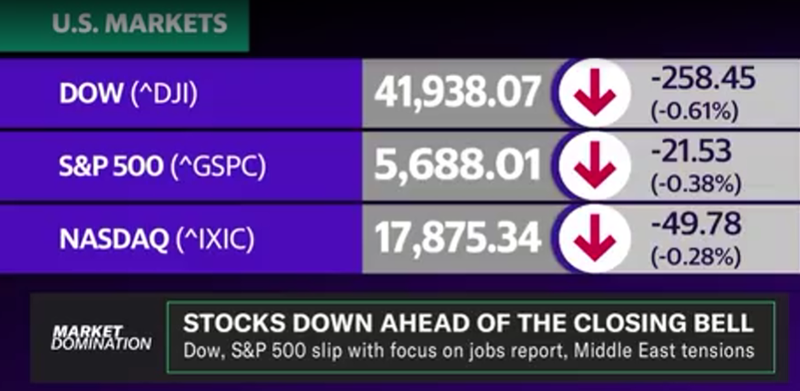
A Week of Rocky Headlines
The past week has been dominated by troubling headlines, from escalating conflict in the Middle East to domestic disruptions in the United States. The intensifying strife between Israel and Iran, with missile launches and military actions in Lebanon, has many questioning the potential global repercussions. At home, Hurricane Helene wreaked havoc across the Southeast, while approximately 45,000 dockworkers went on strike at ports nationwide. However, despite these unsettling events, the stock markets have shown remarkable resilience.
Don’t place a bet until you’ve seen this
Market Stability in the Face of Uncertainty
Contrary to the unease reflected in global headlines, the financial markets have remained relatively steady. Over the past four trading days, the S&P 500, Nasdaq Composite, and Dow Jones Industrial Average have all experienced minor declines—each down around 1% or less. Notably, the Nasdaq and Dow are still within reach of their all-time highs.
This resilience highlights how Wall Street strategists and economists are assessing current risks. While the conflict between Israel and Iran is alarming, Jonas Goltermann, deputy chief markets economist at Capital Economics, indicated that the markets would likely remain stable unless the war significantly widened, particularly if energy supply chains were disrupted. Without such a severe development, the global economy and financial markets may not experience a substantial impact.
Short-Lived Disruptions and Economic Impact
A similar view was taken on the recent dockworkers strike. Though it posed a potential threat to economic growth and inflation, the strike's resolution means it is unlikely to leave a lasting mark. Diego Anzoategui, an economist at Morgan Stanley, remarked that only a prolonged strike would have caused significant economic disruption. This swift resolution serves as a reminder that markets have learned not to "suffer," reacting only when lasting consequences appear inevitable.
Short-Term Risks Versus Long-Term Gains
While the stability of the stock market may be reassuring, caution remains. Tom Lee, head of research at Fundstrat, has expressed concerns about the month ahead. In a recent video message to clients, Lee highlighted two short-term risks: the potential economic damage from the port strike and escalating tensions in the Middle East. While the strike has been resolved, the region’s geopolitical instability remains an area to watch.
Despite these near-term risks, Lee maintains an optimistic long-term outlook. He predicts that the S&P 500 will finish the year higher, driven by the U.S. Federal Reserve adopting a more dovish stance and cutting interest rates. He is convinced that the ongoing expansion of the U.S. economy will propel the market upwards, outweighing the temporary headwinds grabbing the headlines.
Earnings Remain the Ultimate Market Driver
At the heart of market behavior lies a fundamental concept: stock prices are ultimately driven by the future cash flows of American companies. While there will always be reasons to sell, investors must weigh whether these risks will significantly impact earnings. In Lee’s view, the powerful tailwinds pushing the market forward—such as favorable Fed policy and economic growth—hold more weight than the immediate challenges.
For now, it seems that Wall Street’s confidence in the future trajectory of corporate earnings is keeping the markets steady, despite the unsettling headlines dominating the news cycle.
Comments